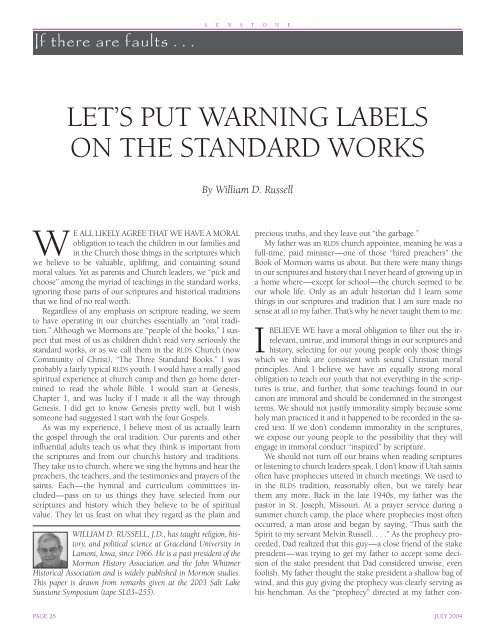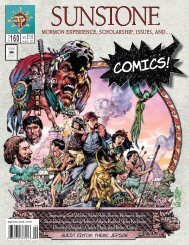is there a place for heavenly mother in mormon theology?
is there a place for heavenly mother in mormon theology?
is there a place for heavenly mother in mormon theology?
Create successful ePaper yourself
Turn your PDF publications into a flip-book with our unique Google optimized e-Paper software.
If <strong>there</strong> are faults . . .<br />
S U N S T O N E<br />
LET’S PUT WARNING LABELS<br />
ON THE STANDARD WORKS<br />
By William D. Russell<br />
WE ALL LIKELY AGREE THAT WE HAVE A MORAL<br />
obligation to teach the children <strong>in</strong> our families and<br />
<strong>in</strong> the Church those th<strong>in</strong>gs <strong>in</strong> the scriptures which<br />
we believe to be valuable, uplift<strong>in</strong>g, and conta<strong>in</strong><strong>in</strong>g sound<br />
moral values. Yet as parents and Church leaders, we “pick and<br />
choose” among the myriad of teach<strong>in</strong>gs <strong>in</strong> the standard works,<br />
ignor<strong>in</strong>g those parts of our scriptures and h<strong>is</strong>torical traditions<br />
that we f<strong>in</strong>d of no real worth.<br />
Regardless of any emphas<strong>is</strong> on scripture read<strong>in</strong>g, we seem<br />
to have operat<strong>in</strong>g <strong>in</strong> our churches essentially an “oral tradition.”<br />
Although we Mormons are “people of the books,” I suspect<br />
that most of us as children didn’t read very seriously the<br />
standard works, or as we call them <strong>in</strong> the RLDS Church (now<br />
Community of Chr<strong>is</strong>t), “The Three Standard Books.” I was<br />
probably a fairly typical RLDS youth. I would have a really good<br />
spiritual experience at church camp and then go home determ<strong>in</strong>ed<br />
to read the whole Bible. I would start at Genes<strong>is</strong>,<br />
Chapter 1, and was lucky if I made it all the way through<br />
Genes<strong>is</strong>. I did get to know Genes<strong>is</strong> pretty well, but I w<strong>is</strong>h<br />
someone had suggested I start with the four Gospels.<br />
As was my experience, I believe most of us actually learn<br />
the gospel through the oral tradition. Our parents and other<br />
<strong>in</strong>fluential adults teach us what they th<strong>in</strong>k <strong>is</strong> important from<br />
the scriptures and from our church’s h<strong>is</strong>tory and traditions.<br />
They take us to church, where we s<strong>in</strong>g the hymns and hear the<br />
preachers, the teachers, and the testimonies and prayers of the<br />
sa<strong>in</strong>ts. Each—the hymnal and curriculum committees <strong>in</strong>cluded—pass<br />
on to us th<strong>in</strong>gs they have selected from our<br />
scriptures and h<strong>is</strong>tory which they believe to be of spiritual<br />
value. They let us feast on what they regard as the pla<strong>in</strong> and<br />
WILLIAM D. RUSSELL, J.D., has taught religion, h<strong>is</strong>tory,<br />
and political science at Graceland University <strong>in</strong><br />
Lamoni, Iowa, s<strong>in</strong>ce 1966. He <strong>is</strong> a past president of the<br />
Mormon H<strong>is</strong>tory Association and the John Whitmer<br />
H<strong>is</strong>torical Association and <strong>is</strong> widely publ<strong>is</strong>hed <strong>in</strong> Mormon studies.<br />
Th<strong>is</strong> paper <strong>is</strong> drawn from remarks given at the 2003 Salt Lake<br />
Sunstone Symposium (tape SL03–255).<br />
precious truths, and they leave out “the garbage.”<br />
My father was an RLDS church appo<strong>in</strong>tee, mean<strong>in</strong>g he was a<br />
full-time, paid m<strong>in</strong><strong>is</strong>ter—one of those “hired preachers” the<br />
Book of Mormon warns us about. But <strong>there</strong> were many th<strong>in</strong>gs<br />
<strong>in</strong> our scriptures and h<strong>is</strong>tory that I never heard of grow<strong>in</strong>g up <strong>in</strong><br />
a home where—except <strong>for</strong> school—the church seemed to be<br />
our whole life. Only as an adult h<strong>is</strong>torian did I learn some<br />
th<strong>in</strong>gs <strong>in</strong> our scriptures and tradition that I am sure made no<br />
sense at all to my father. That’s why he never taught them to me.<br />
IBELIEVE WE have a moral obligation to filter out the irrelevant,<br />
untrue, and immoral th<strong>in</strong>gs <strong>in</strong> our scriptures and<br />
h<strong>is</strong>tory, select<strong>in</strong>g <strong>for</strong> our young people only those th<strong>in</strong>gs<br />
which we th<strong>in</strong>k are cons<strong>is</strong>tent with sound Chr<strong>is</strong>tian moral<br />
pr<strong>in</strong>ciples. And I believe we have an equally strong moral<br />
obligation to teach our youth that not everyth<strong>in</strong>g <strong>in</strong> the scriptures<br />
<strong>is</strong> true, and further, that some teach<strong>in</strong>gs found <strong>in</strong> our<br />
canon are immoral and should be condemned <strong>in</strong> the strongest<br />
terms. We should not justify immorality simply because some<br />
holy man practiced it and it happened to be recorded <strong>in</strong> the sacred<br />
text. If we don’t condemn immorality <strong>in</strong> the scriptures,<br />
we expose our young people to the possibility that they will<br />
engage <strong>in</strong> immoral conduct “<strong>in</strong>spired” by scripture.<br />
We should not turn off our bra<strong>in</strong>s when read<strong>in</strong>g scriptures<br />
or l<strong>is</strong>ten<strong>in</strong>g to church leaders speak. I don’t know if Utah sa<strong>in</strong>ts<br />
often have prophecies uttered <strong>in</strong> church meet<strong>in</strong>gs. We used to<br />
<strong>in</strong> the RLDS tradition, reasonably often, but we rarely hear<br />
them any more. Back <strong>in</strong> the late 1940s, my father was the<br />
pastor <strong>in</strong> St. Joseph, M<strong>is</strong>souri. At a prayer service dur<strong>in</strong>g a<br />
summer church camp, the <strong>place</strong> where prophecies most often<br />
occurred, a man arose and began by say<strong>in</strong>g, “Thus saith the<br />
Spirit to my servant Melv<strong>in</strong> Russell. . . .” As the prophecy proceeded,<br />
Dad realized that th<strong>is</strong> guy—a close friend of the stake<br />
president—was try<strong>in</strong>g to get my father to accept some dec<strong>is</strong>ion<br />
of the stake president that Dad considered unw<strong>is</strong>e, even<br />
fool<strong>is</strong>h. My father thought the stake president a shallow bag of<br />
w<strong>in</strong>d, and th<strong>is</strong> guy giv<strong>in</strong>g the prophecy was clearly serv<strong>in</strong>g as<br />
h<strong>is</strong> henchman. As the “prophecy” directed at my father con-<br />
PAGE 26 JULY 2004
















